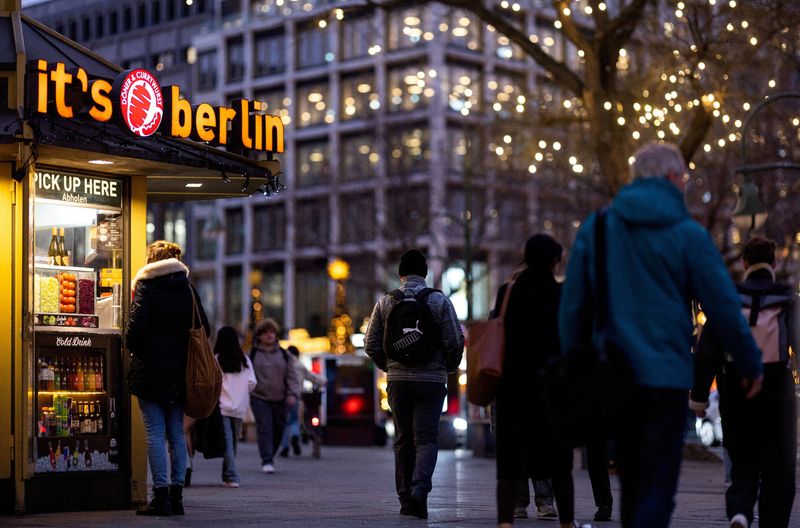By Maria Martinez
BERLIN (Reuters) - Kira Siewert did not have much cash to spare as an 18-year-old doing an apprenticeship three years ago, but when she wanted to treat herself to new clothes she became one of a growing number of Germans turning to short-term online credit schemes.
Siewert bought trousers and tops via Klarna, an app that gave her the option of paying after 30 days or paying in three interest-free monthly instalments. She made a first order of 120 euros ($129), but only had to pay for the items she kept.
Such a purchase is part of a new trend that seems alien to her parents' generation, in a country that has traditionally prided itself on thrift.
"They have a completely different view of the topic than I do," Siewert said. "They would only buy what they can pay for directly, as they probably also want to avoid the risk of possible debt."
“I think that in our generation, this topic of credit is no longer so secretive,” she added.
Many Germans, particularly younger ones, are taking loans of less than 1,000 euros via app-based and other credit offerings as inflation makes it harder to make ends meet but high job security makes them feel confident about repaying the money.
"It is a long term trend, which will mean that over the long run, German consumers become a bit more normal, like other Europeans," Holger Schmieding, chief economist at Berenberg, told Reuters.
While they only make up a fraction of overall credit, such quick loan schemes could offer a consumption boost to Europe's largest economy, as its export-based model is being challenged by weakness in global demand.
“We assume that the savings rate will fall and that Germans will start to increase their consumption,” said Charles Seville, senior director in Fitch Ratings’ economics team. “That would be the main driver of a very shallow recovery in 2024.”
Germany has the highest saving rate for households in Europe, with households on average setting aside close to 20% of their income, well above the 12.7% European Union average, Eurostat data for 2022 showed. Credit cards are not popular in Germany, where only 29% of citizens used them in the last 12 months, compared to 60% in France.
But in 2022, which had an average inflation rate of 7.9%, Germany saw a surge in instalment loans. The credit rating agency SCHUFA said more than 9.1 million contracts were signed, a 30% increase from the previous year.
More than 3.8 million, or 42%, of the 9.1 million contracts were for amounts under 1,000 euros. Among the 20-39 age group, such loans made up more than 50% of contracts.
"People, especially younger people, are increasingly financing smaller amounts with loans," said Kai-Friedrich Donau, head of Corporate Social Responsibility (CSR) at SCHUFA.
"Loans are relatively small at first in terms of the amount, with people from 18 to 19 years. But then, when you have a job and a regular income, the amount increases massively," Donau said.
Buy-now-pay-later (BNPL) schemes are especially popular in Germany, Finland and the Netherlands among EU countries, according to data from the Bank of International Settlements. One in four merchants in Germany offer this option online.
They are at the heart of the business model for Klarna, which offers short-term dealer-financed loans that cost the end customer nothing, said Nicole Defren, head of Klarna in Germany.
The schemes are especially popular at the opposite ends of the age scale, with younger Gen Z customers - people born after 1996 - and older baby boomers, the generation born in the two decades after World War Two.
“The main advantage of buy-now-pay-later schemes compared to conventional loans is that these products are tied to a specific purchase and this prevents end customers from actually accumulating debt,” Defren said.
NOT LIVING ON RICE AND BEANS
Many older Germans believe in living within their means, recalling the thrift ethos that was part of the country's post-war reconstruction.
But younger Germans may be less wedded to this idea, and are buoyed by a labour market that remains resilient despite a wider economic slowdown.
“If you think you've lost your job but you'll get another one very quickly, it's not a permanent change in your income, it's just a temporary change," said Michael Burda, professor of economics at Humboldt University in Berlin.
"If you're a young educated person and you're looking at a bright future, why should you live on beans and rice now? Maybe you could borrow some money,” Burda told Reuters.
Moreover, German customers are still careful to buy only what they can afford, Defren from Klarna said.
"Products like pay-in-3 are very popular because you can then split it up a bit, but perhaps only for three months, but not drag it out for months or years like with a revolving credit option or a credit card," she said.

Germans' repayment rates are also high. According to SCHUFA, the repayment rate of instalment loans in 2022 was 97.9%.
($1 = 0.9278 euros)